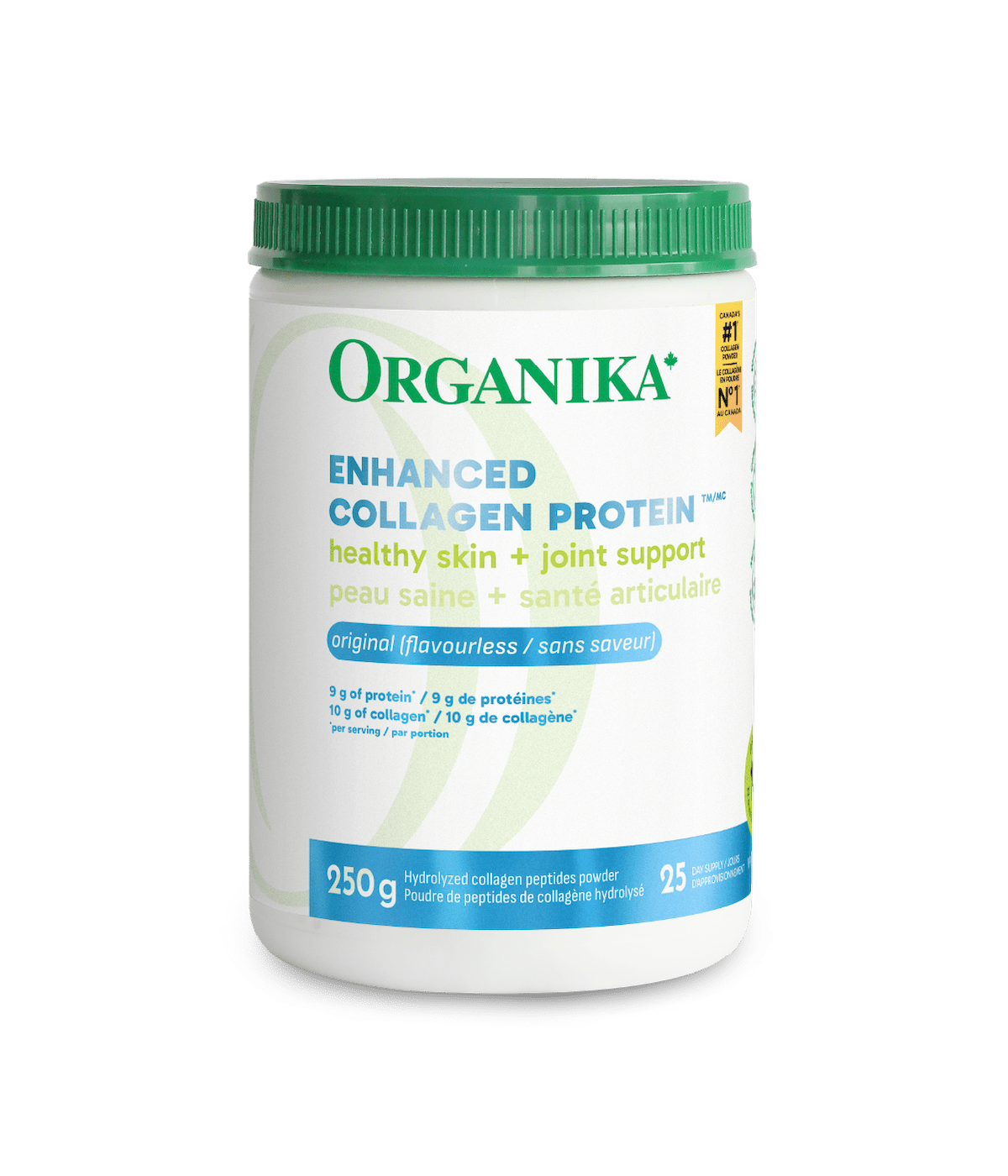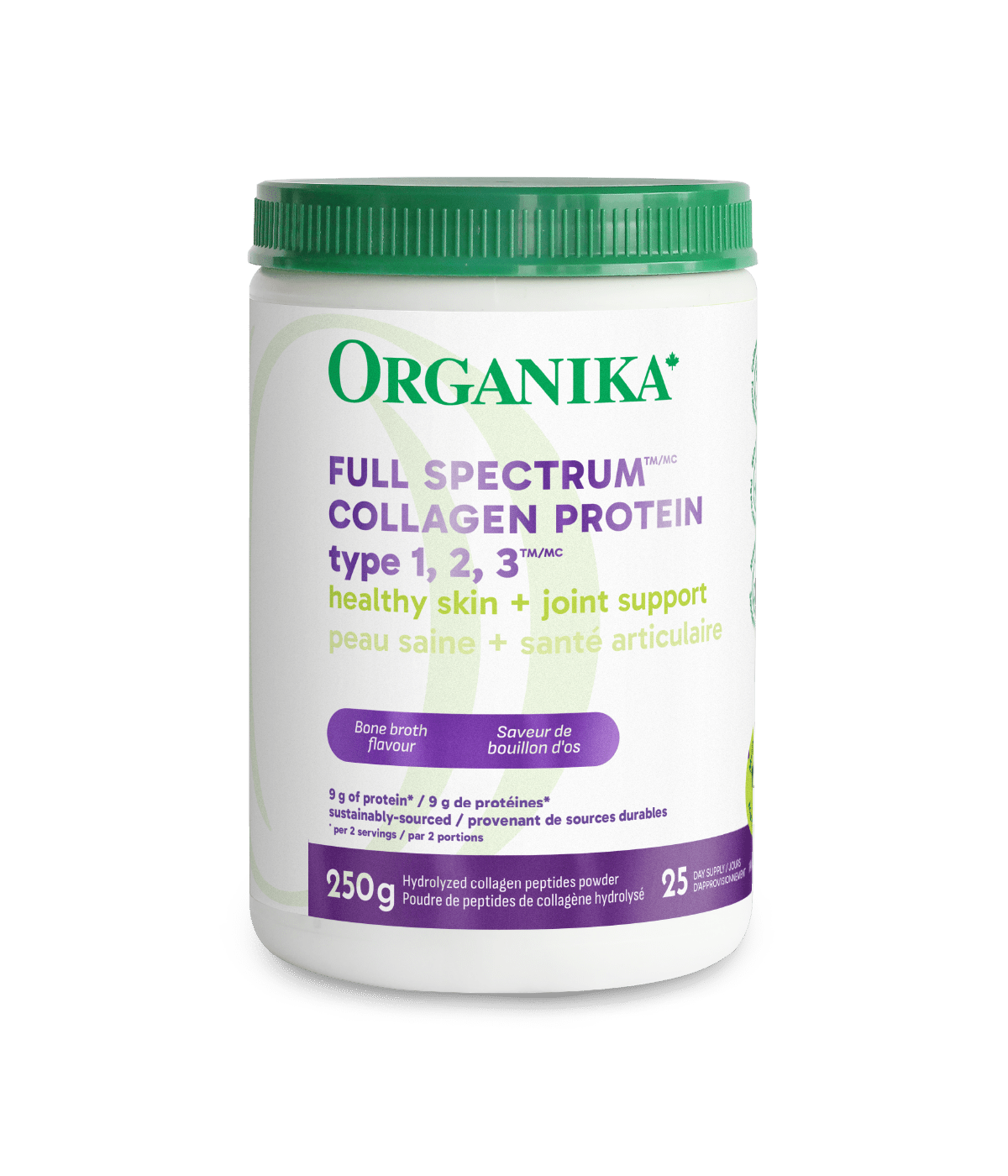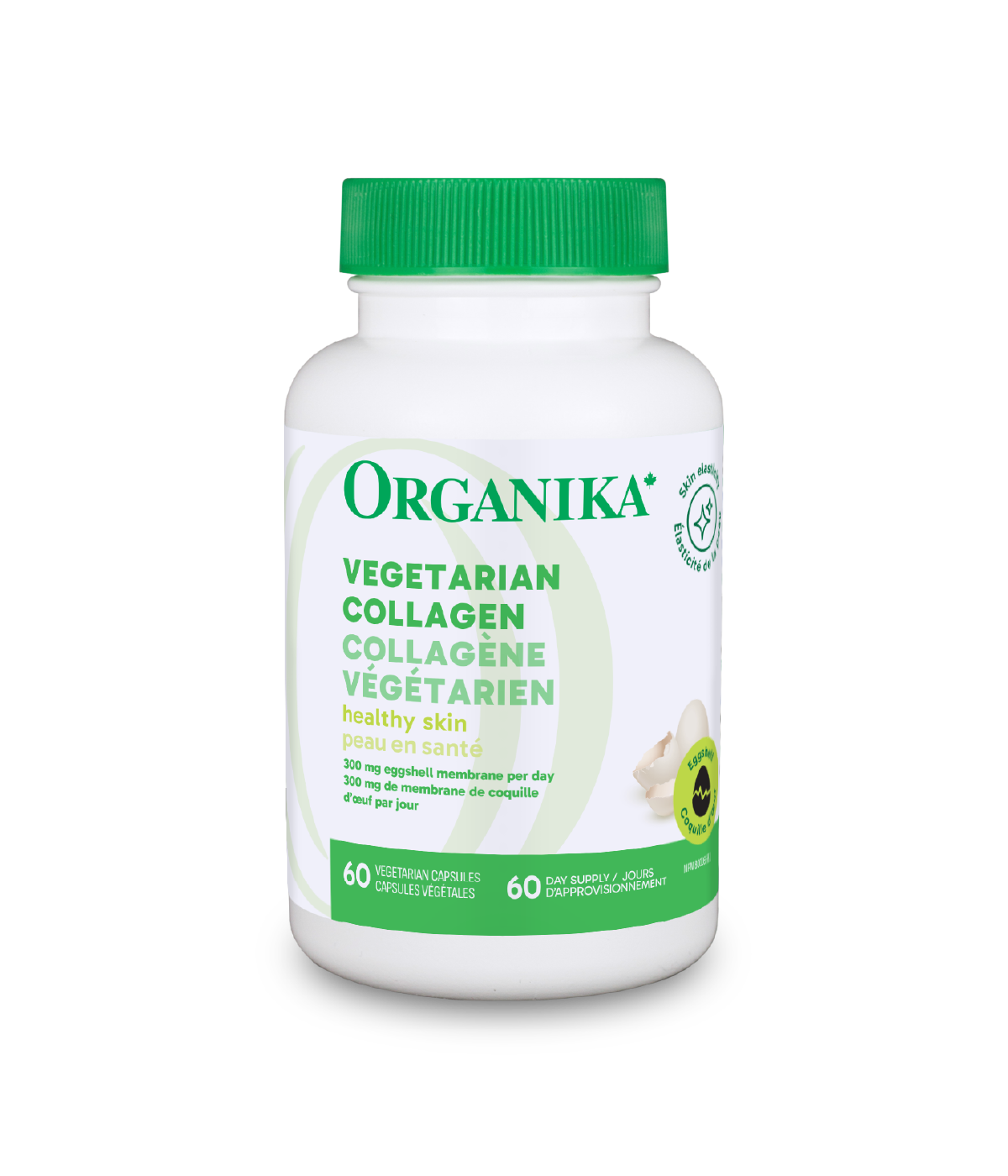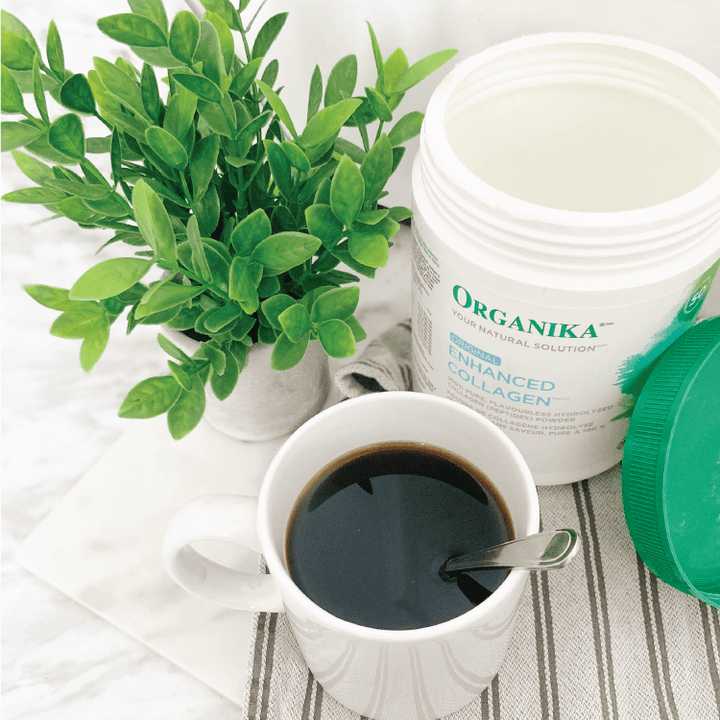There’s different types of collagen?
Collagen has become the talk of the health industry, fitness industry as well as the beauty industry.
Why? It’s an important protein. In fact, it is the most abundant protein in your body, making up 30% of your protein mass.[1] Collagen is found in our bones, connective tissues (joints, ligaments, and cartilages), muscles, hair, skin, nails and even our blood vessels.
Though important for many reasons, collagen’s primary function is strength and structure. Think of it as the glue that holds your body together. Collagen peptides are what give your skin elasticity, shape, and structure in joints. Now you may understand why there are various types of collagen (16 to be exact).
Regarding supplements, the most talked about types of collagen are type 1, 2, and 3.
Collagen supplements come in various forms of either hydrolyzed collagen (collagen peptides, collagen powder, collagen capsules or liquid form), gelatin or undenatured collagen. Hydrolyzed collagen peptides seem to be the easiest for the body to absorb and use.

Type 1 Collagen
Where is it found?
Type 1 collagen is found in our hair, skin and nails and is the most abundant type of collagen in our body, making up around 90%. Type 1 collagen also can be found in our bones – making up around 40% of our bone matrix as well as in our ligaments. Sources of Type 1 collagen include marine and bovine collagen.
What does it do?
Type 1 collagen is essential when it comes to the beauty benefits of Collagen as it is what is responsible for our skin elasticity, strength and helps with anti-aging. Cellulite is a loss of elasticity in our skin and type 1 collagen plays a significant role in that.
Products with Type 1 Collagen Peptides
- All our Enhanced Collagen products contain Type 1 and 3 collagen, sourced from grass-fed bovine with no hormones or antibiotics
-
Marine Collagen Powder made from fish scales containing only Type 1 collagen
-
Liquid Marine Collagen with Biotin and Vitamin C is marine collagen in liquid form with beauty-boosting ingredients
-
Salmon Collagen Capsules derived from the skin of wild salmon, rich in Type 1 collagen only
-
Effervess tablets made with marine collagen and vitamin C
-
Beef Bone Broth rich in Types 1 & 3 collagen
Type 2 Collagen
Where is it found?
Type 2 Collagen is what we find in our connective tissues – think joints, ligaments, and cartilage. Chicken is known to have a very high amount of type 2 collagen in it.
What does it do?
Type 2 collagen is what is responsible for maintaining the structure of our bones and cartilage. When we have a loss of collagen in our body (it naturally decreases as we age and is affected by smoking or UV light exposure), cartilage and ligaments start to weaken and break down, leading to damage and osteoarthritis.
Products with Type 2 Collagen Peptides
-
Biocell Collagen derived from chicken cartilage (sternum) rich in type 2 collagen, with added hyaluronic acid and chondroitin sulfate for optimal joint health
-
Chicken Bone Broth has type 2 collagen as well as essential glycosaminoglycans (GAG’s) to help with connective tissue

Type 3 Collagen
Where is it found?
Type 3 collagen is also an abundant form of protein found in our body and found alongside type 1 collagen fibers. It is in the reticular fibers in the body. Those reticular fibers are your bones, muscles, organs, blood vessels, dentin, tendons as well as some other connective tissues.
What does it do?
Type 3 collagen alongside type 1 collagen is essential for improving the elasticity in our skin, anti-aging, improved circulation, healthy bone matrix, healthy nails and thicker hair.
Products with Type 3 Collagen Peptides
Enhanced Collagen is the #1 selling Collagen Powder in Canada* and made with grass-fed bovine, antibiotic and hormone free, offering both type 1 and 3 hydrolyzed collagen peptides.
- Try any of our products with Enhanced Collagen
-
Beef Bone Broth: Excellent source of type 3 collagen! Rich in essential minerals and GAG’s known to contain Hyaluronic acid, chondroitin, and glucosamine

What Types of Collagen Do You Need?
Now that you know the various types of collagens, you may be wondering which one to use.
1. Let’s start with sourcing the best types to consume. Collagen (all types) is a large molecule, so start by choosing supplements that have gone through hydrolyzation. Look for hydrolyzed collagen peptides for optimal absorption.
2. Next, choose your collagen supplement based on what your health needs are, what benefits you would like to see and how each type of collagen can help your body overall.
a) Are you focused on beauty and bone and joint health – you may want types 1 and 3
b) If you are only focused on joints and ligaments – you may want bone broths that are rich in Type 2
3. Third, choose the one that suits your lifestyle best. Do you prefer powder (to mix into your choice of beverages or water), capsules, or liquid?

If you feel you want to supplement with all three types of collagen, that is acceptable. With collagen consumption you are also getting an intake of 17 other types of amino acids that are beneficial as well.
“If you are looking for an overall collagen 1-5, combine Full Spectrum and the Vegetarian Collagen capsules. Enhanced Collagen is great because it has type 1 and 3. Type 1 for hair, skin, nails bones etc. Type 3 is great to support the gut health. I would suggest type 2 collagen for those who are looking to specifically support joints/inflammation.” Stephanie Lannon, R.H.N. and Wellness Educator
This is a plentiful form of Types 1, 2, 3 collagen and can keep muscles and tendons together and even rebuild your cartilage, helping to fight the symptoms of arthritis.
“With age, collagen formation declines naturally, leading to a loss of elasticity, strength, and tone throughout the body. Organika’s Full Spectrum Collagen provides you with Bovine Collagen types 1 & 3 (giving you thick hair, strong nails, supple skin, healthy joints, as well as supporting a healthy digestive tract), Marine Collagen Type 1 (supports fuller hair, stronger nails, and youthful skin), and Chicken Bone Broth Type 2 Collagen (naturally high in hyaluronic acid and glycosaminoglycans that help build strong joints and connective tissues).” - Joleen Gruber, R.H.N. and National Educator.
Want to choose collagen but are vegetarian or vegan?
If you are vegan, we have a Plant-Based Collagen Booster for those wanting to simply increase their own collagen production. For vegetarians we also carry Vegetarian Collagen made from natural eggshell membranes (contains type 1 collagen and others).
What Do the Experts Say About Collagen Types?
Resident experts Joleen Gruber, R.H.N. & National Educator, and Stephanie Lannon, R.H.N. & Wellness Educator, weigh in on commonly asked questions about collagen, types of collagen and consuming collagen peptides.
Should one be aiming for all types through their diet? Is Type 1 and 3 enough?
It really depends on the desired benefits/needs. Enhanced collagen type 1 and 3 (Enhanced Collagen) is suitable for most (except for pescatarian/vegetarian/vegan or opposed to taking bovine). Once you know what you would like to get out of collagen then you can select your product. While it’s not necessary to aim for all of them, it is fine to consume all as they serve different areas of the body.
What advice do you have for people that are solely marine or Type 1 collagen?
Change it up and add different types of collagen to fill in the gaps (joint health, hair, skin, nails, cartilage) because as we age collagen is declining from all areas of the body.
If, however, you do only want to focus on the beauty benefits and have little to no joint concerns, it is perfectly fine to go for solely Marine or Type 1 collagen (for which we have options as well).
What are the products you typically recommend for someone looking for each type of collagen?
The beauty of collagen is the fact it is customizable to each person’s lifestyle.
Enhanced Collagen is great place to start and is Canada’s #1 collagen powder as it has type 1 and 3 and is a great collagen for those who are looking for skin, hair, nails, joints, gut support, muscles etc. There are also blends that offer added benefits; for example, better sleep (Enhanced Collagen Sleep), energy (Enhanced Collagen Vitality) etc.
For pescatarians, then Marine Collagen may be best.
For older adults, or if you truly want a range of collagen, they can either go with a Full Spectrum Collagen or Vegetarian Collagen capsules. Full Spectrum Collagen has type 1, 2 and 3. Vegetarian Collagen (eggshell membrane) that includes type 1,4 and 5 collagen. Both can be combined with our Full spectrum Collagen to get all 5 collagens.
For busy bees, you may want to try Liquid Enhanced Collagen as taking a shot a day may be easier than finding an opportunity to make a drink or meal using the powder form.
Is there a maximum amount of collagen per day that is recommended/suggested?
There is no upper limit for collagen. However, usually between 2.5 g to 15 g per serving is sufficient to reap the benefits.
Our body absorbs everything better if it is spread throughout the day There is not a maximum level per se, if you consume too much, your body will just burn the excess as fuel, or you may experience gastrointestinal disturbances.
Note: Remember collagen is a protein (though not a full protein) and will contribute to the amount of protein getting elsewhere. Therefore, the amount you can consume may vary. If you are an athlete, then the amount of protein/collagen you can consume may be up to 25 g per day. It’s best to speak to a nutritionist to ensure you are getting a collective amount of protein that is within the suggested amount your body needs.
Have more questions?
Talk to our experts about product recommendations.
Article written by
Organika Health
















